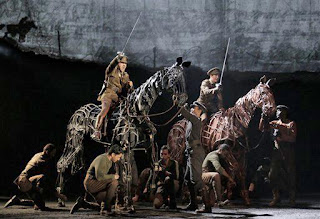Well, after much deliberation, I took the proverbial plunge and treated myself to what is probably the hottest media franchise so far this year. The much-lauded adaptation of the first novel in Suzanne Collins' trilogy, although less impressive than it would be on the big/IMAX screen (do I regret not seeing it in theaters?), certainly delivered not only an accurate adaption of the original material but more than a healthy dose of action, drama and true human emotion.
As far as accuracy goes, I would give The Hunger Games a solid 85% for staying faithful to the book. All the major players were on the stage and delivered their lines beautifully. The most notable, or rather the most consistent, change was what I would call "trimming". In the book, there are significant stretches where the plot line becomes stilted/monotonous and action is at a minimum. Strictly speaking, however, this is probably a true reflection of how the characters actually felt during the competition; alone in the silent wilderness for hours or days at a time, sleeping with one eye open (cliche, I know, but very apt) while physically and emotionally exhausted, constantly on the watch in every direction with minimal food and water; its enough to make anyone anxious. In the movie, much of that slow-moving narrative, as well as sizable portions of general description and Katniss Everdeen's personal musings (the whole book was told in first person), were eliminated. While not seriously affecting the powerful emotional edge of the story, it did remove a good deal of the back story surrounding various characters, especially the more minor competitors. In this sense, if I had not read the book beforehand, I would have had a much more difficult time following the plot.
Another area of alteration that jumped out at me involved the aesthetics of the film (particularly the food, clothing/physical appearances and various physical settings, which Collins describes in precise detail), but this aspect was a bit more ambiguous than the alterations to the actual storyline. Although various aesthetic elements were altered from the book descriptions, the impact of those elements was still just as impressive (my personal favorite was the parade of the tributes, when Katniss and Peeta came blazing in wearing black leather with blue and orange flames streaming from their backs).
The accompanying music was either dramatic or intimate (sometimes both) when the situation required it, and lent a powerful feeling to the already stunning visuals and emotional plot line.
All in all, I believe that The Hunger Games certainly lives up to its monumental pop culture reputation, but I would recommend reading the original book first, if for no other reason than to fully appreciate Collins' skillful mastery of the hero's journey narrative.
SEE MY REVIEW OF THE ORIGINAL BOOK




